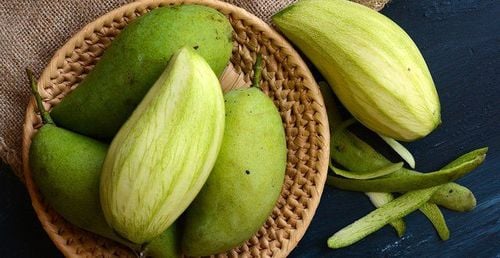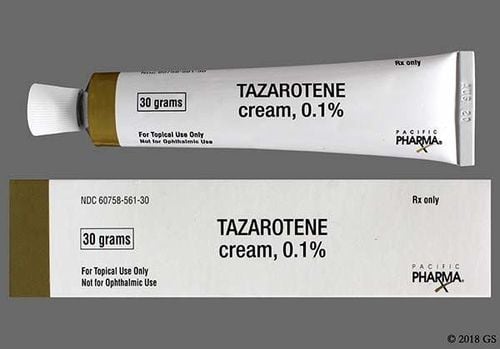This is an automatically translated article.
Mango peel is very nutritious which contains many nutritional components such as antioxidants, vitamins and fiber. Although it may offer health benefits, it has an unpleasant taste, can be preserved by pesticide residues, and contains compounds that can cause allergic reactions. Therefore, you can eat the peel of a mango, but it is not necessary for the supply of nutrients to the body.
1. Mango is a fruit rich in nutritional value
Mango is a surprising fruit. They have a long seed in the middle surrounded by mango flesh and an outer layer of mango skin. This peel has a thick and almost pliable texture but is quite firm, not easily peeled off like banana or orange peels.
The skin of the fruit acts as a protective layer for the soft, thin flesh inside. Although this crust is usually discarded, the majority of these crusts are edible. Because it contains quite a lot of nutrients such as fiber, vitamins and minerals and other powerful plant compounds.
Mango is a popular fruit whose skin is usually removed and thrown away before eating. However, some people argue that mango skin is very nutritious and should be consumed instead of thrown away. So is it really good to eat mango peel?
2. What are the benefits of eating mango peels?
Nutrients and plant compounds can provide a variety of benefits. Mango is a tropical fruit known for its sweetness and high nutritional content. Until the fruit is fully ripe, the green skin of the mango will turn yellow, red or orange, depending on the variety of mango.
The nutritional benefits of mango are well established. It is an excellent source of fiber, vitamins A, C, E and B6, as well as the minerals potassium and copper. Plus, mangoes also contain various beneficial plant compounds, including polyphenol and carotene antioxidants.
Like the flesh of a mango, the skin of a mango is very nutritious. A few studies show that the skin of a mango contains polyphenols, carotenoids, fiber, vitamin C, vitamin E, and various beneficial plant compounds. Additionally, studies have also found that people who consume diets high in vitamin C, polyphenols, and carotenoids have a lower risk of heart disease, certain cancers, and cognitive decline.

Vỏ xoài chứa một lượng chất dinh dưỡng tốt cho cơ thể người dùng
One test-tube study showed that mango peel extract exhibited stronger antioxidant and anti-cancer properties than mango pulp extract. Furthermore, the peel of this sweet fruit is high in triterpenes and triterpenoids. These are compounds that have been shown to have beneficial effects in anti-cancer and anti-diabetes.
Furthermore, the skin of a mango is rich in fiber, which is important for digestive health and hunger regulation. In fact, fiber makes up 45-78% of the total weight of the mango skin.
3. Potential drawbacks when eating mango peels
Although the skin of a mango is known to be a significant source of nutrients, its use carries some risks. So, the question that people are often interested in is whether eating the skin of a mango is allergic or if it is hot to eat the skin of a mango. Here are some possible risks of eating mango skins:
3.1. May cause allergic reactions Mango peels contain urushiol, which is a juice of organic compounds also found in poison ivy and poison oak. Urushiol may promote allergic reactions in some people, especially those who are sensitive to poison ivy and other urushiol-heavy plants. Therefore, the consumption of mango skin can cause an itchy rash and swelling of the skin.
3.2. May Contain Pesticide Residues Many fruits and vegetables are treated with pesticides to fight infections and insects that can damage the crop, and mangoes are among them.
While removing the mango peel reduces the consumption of these potentially harmful chemicals, the consumption of mango skins has consistently increased significantly. Several studies linking pesticide exposure and negative health effects suggest a number of possible risks, such as endocrine system disruptions, fertility problems, and more. fertility and increase the risk of certain cancers. However, keep in mind that these effects are mainly related to frequent pesticide exposure, not to small amounts ingested into the skins of fruits including mango skins.

Vỏ xoài có thể chứa dư lượng thuốc trừ sâu
3.3. Has an unpleasant texture and taste Although the mango fruit is sweet, soft, and pleasant to eat, the texture and flavor of the mango skin may not seem so appealing. It's relatively thick, hard to chew, and has a slightly bitter taste. The skin of a mango has nutritional benefits, but the fibrous texture and nutty flavor of the mango skin can make you less likely to like it.
4. Should you eat mango peel?
Mango peels are edible and the ingredients in mango skins are an established source of important nutrients and powerful plant compounds. However, you may be wondering if the potential benefits outweigh the disadvantages outlined above, such as chewy texture, bitter taste and potential pesticide residues or allergic reactions... Should you eat mango peel?
In fact, the same nutrients in mango skins also exist in many other fruits and vegetables. Therefore, it is not necessary to endure the unpleasant taste of mango peel to achieve it. the potential health benefits it provides to the body.
5. How to eat mango peel?
If you want to try eating the peel of a mango, there are a few ways to eat it. The simplest way is to simply consume the mango peel the way you would with an apple, pear or peach, i.e. you would eat the mango without removing the skin.
To mask and lessen the slightly bitter taste, try adding a few slices of mango with skin to your favorite smoothie. Or mixing mango skin with other delicious ingredients is a great way to increase the appeal of mango skin making it more palatable.
Whether sliced or eaten whole, be sure to wash the mango skin thoroughly with water or a fruit and vegetable wash to remove pesticide residue.
In short, it is possible to eat the skin of a mango, but it is not necessary. Because, simply consuming a diet rich in whole foods, including fresh, colorful produce... will provide the body with all the essential nutrients.

Trước khi sử dụng vỏ xoài, nên rửa kỹ bằng nước muối hoặc nước rửa trái cây
Vinmec International General Hospital is a high-quality medical facility in Vietnam with a team of highly qualified medical professionals, well-trained, domestic and foreign, and experienced.
A system of modern and advanced medical equipment, possessing many of the best machines in the world, helping to detect many difficult and dangerous diseases in a short time, supporting the diagnosis and treatment of doctors the most effective. The hospital space is designed according to 5-star hotel standards, giving patients comfort, friendliness and peace of mind.
Please dial HOTLINE for more information or register for an appointment HERE. Download MyVinmec app to make appointments faster and to manage your bookings easily.
Reference source: healthline.com













